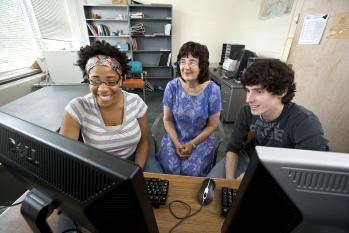COVER STORY
Undergrads seek to change the world through research
(Page 5 of 6)
From left, Sarah Elizabeth Long '09 at work with environmental engineering professor Christine Shoemaker and fellow student Paul Muller. Long has researched managing water quality through sensor networks and weather forecasts. See larger image
One example: Michael Barany '08, a Marshall Scholar whose undergraduate research, supported by the Rawlings Presidential Research Scholars and College Scholar programs, culminated in a thesis examining the history of witnessing truth in mathematics. "It's an extraordinary piece of research that envelops the history of math in the context of interdisciplinary histories, rhetoric and institutional authority," Murray observes. "Our hope is that [work like Barany's] will provide students with the critical awareness and acuity with which they can leave Cornell and make crucial moral, critical and ethical interventions on the social scene -- something that is very much a part of our ethos in the humanities at Cornell."
Another case in point: Jason Beekman '08, who was a government and history major in the College of Arts and Sciences. Now a first-year law student at Cornell, Beekman was a sophomore when a course with government professor Mary Katzenstein inspired him to learn more about the prison system. After several years as a research assistant for Katzenstein, he took part in a summer project teaching theater and performance at Auburn Correctional Facility, a maximum-security prison in central New York.
"At first I was petrified. And you can only imagine how my mother felt," he says. But his summer experience led to an honors thesis on the financial obstacles to legal access for prisoners. He interviewed law librarians, N.Y. Department of Correctional Services personnel and nonprofit legal services personnel, analyzed filing fees and other hidden costs, and considered a multitude of angles from access to prison law libraries to how the issue fit within the merging internationally recognized human rights framework.
The project, he says, was "the highlight of my academic career," leading him to law school and, he hopes, to a career in public interest law. "I will always have the lessons I learned from my thesis in mind," he says.
The same goes for Jane Olin-Ammentorp '09, whose research, also supported by the Rawlings Presidential Research Scholars program, examines the legal standing and human rights effects of the barrier in the West Bank (between Israel and Palestine) as well as the role of public art and graffiti. The research, she says, combines her various interests -- from human rights and international law to aesthetics and public art -- into a project she hopes will influence the way people view the ongoing conflict.
"I hope my work will draw more attention not only to the conflict itself but also to the politics of public art and the way in which all issues are ultimately interdisciplinary," says Olin-Ammentorp.